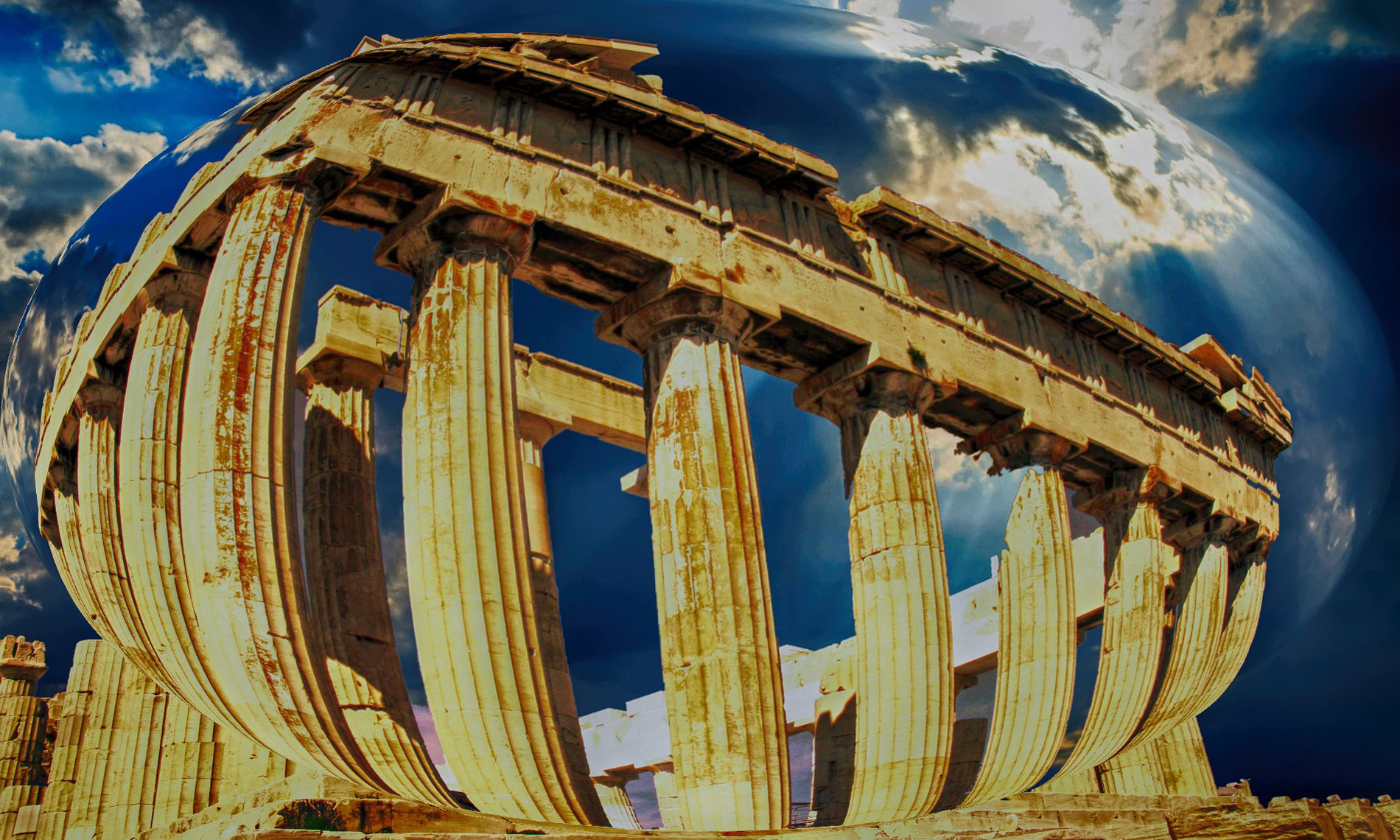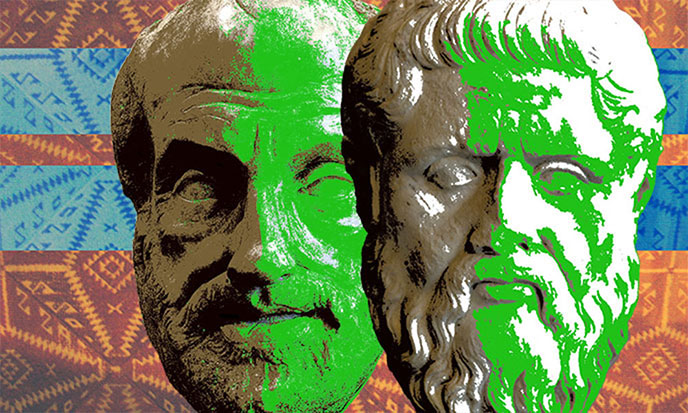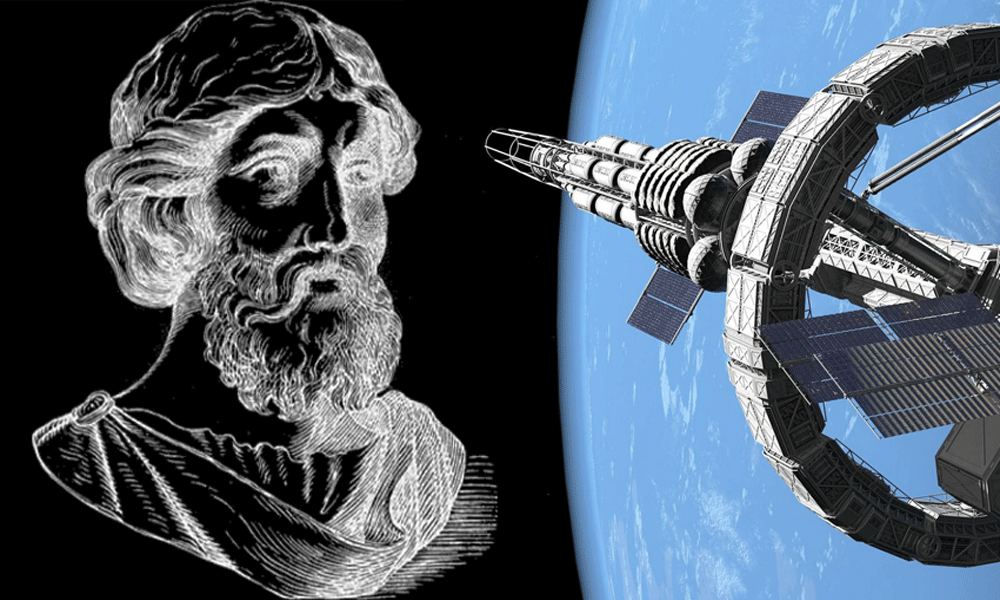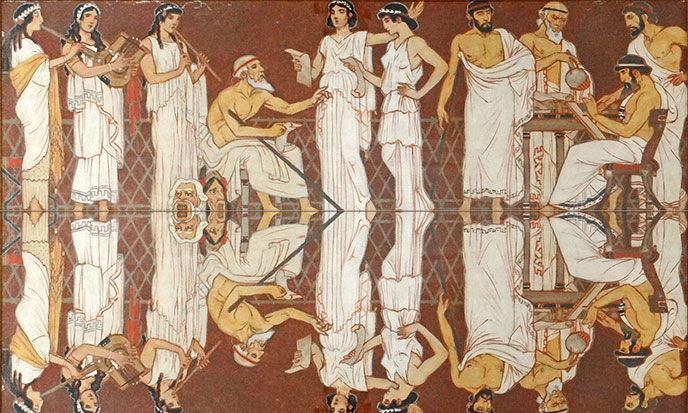
We were taught some nonsense in school! For example that our fault oxidntalela civilization is wanted finds its origin in ancient Greece. That’s not true. The starting point is much earlier. Very much earlier. Our culture is not Greco-Latin, but more ancient. The Romans and the Greeks did not invent everything. Far from it! They were heirs of an earlier wisdom. Heirs of advanced technology and science…
The West was not born in Greece
Philosophy was not born in Greece, neither science, nor our civilization. Like all other ancient peoples, the Greeks did not invent everything, they mostly merely reproduced previous knowledge. And they didn’t understand much. The source of this teaching was too far away. Too different from what they knew in their time.
Greco-Latin Antiquity is not a source, but a filter relay. A transmission chopped, covered, partial and partial. And very incomplete. because neither the Greeks nor the Romans wrote all their sources, but most of what they passed on did not reach us. It is estimated that we possess only one tenth of the writings and works of Greece and Rome. The tenth! What we don’t have could change our vision of the distant past. I’m working on that site.
I have seen many of your Greeks and Romans! To hear you, one cannot fart that has not already been farted twice by them! And the Hebrews! And the Bible!… But long before Christ there was a revelation superior to that of Israel, my little brothers! It did not come from the East, but from the West! And the Druids received it from the god of the seas, that is to say it came from the other side!… (source)Henri Vincenot, The Stars of Compostela
Transmitted by the Celtic Druids, the revelation about our origins came from the former gods. From Atlantis where reigned Poseidon the god of the seas. From Hyperborea where the Great Goddess reigned over the vast ocean of space, her Thousand Stars empire — Alcor’s Ana, represented on Earth by his warlord, Rama Zeus Yahweh the conqueror.

Philosophy was not born in Greece
No, under no circumstances were we born in Greece. Our historians could have understood this if they had taken the pleasure of reading Diogenes Laërce, the Greek scholar who wrote Life, doctrines and sentences of illustrious philosophers. The author lists several dozen ancient thinkers, scholars and sages, not mentioning a single one that is not Greek. Yet his zeal betrays him from the introduction:
“It has often been said that philosophy was not born in Greece. AristoteLivre de la Magie et SotionFiliations, Book XXIII say that it was invented by the Magi of Persia, the Chaldeans of Assyria, the Yogis of India, the Celtic and Gaulish Druids. They quote ancient Phoenician sages, thracians and lybians. As for the Egyptians, they claim that Hephaestus, the creator of the principles of philosophy taught by priests and prophets, was the son of the Nile.” (source)Diogenes Laertius, The life and work of the great philosophers
Diogenes Laerce resents these objections, of course. For him, a good Greek, and for the rest of the world behind him, it was obviously his beloved country, Greece, who invented everything. “In attributing to foreigners the inventions of the Greeks, all these authors sin in ignorance, for the Greeks have not only given birth to philosophy, but to the whole human race.” (source)Diogenes Laërce, The life and work of the great philosophers
Well, the case is clear, this Greek flatters the ego of his Greek audience, he adds to it, it can be understood. He still feels obliged to mention the true origins of Greek thought: the Celtic Druids, the Magi of Chaldea, the priests of Egypt, the Yogis of India, and I would add, at the source of all their knowledge, Atlantean science.

Astronomy is not born in Greece
“The history of astronomy pretends that the Greek astronomer and mathematician Hipparchus (194 to 125 BCE) discovered this astronomical phenomenon, but … is that correct? no work of this astronomer who would have discovered the precession towards 150 AEC. ” (source)Alfred Weysen, The Temple of Secrecy and the Apocalypse He undoubtedly discovered it in an earlier text, like Pythagoras who copied his famous theorem from writings dating back 2 millennia before him.
Thus, Hipparchus was awarded the invention of trigonometry, until this: “After long studies, scientists from Sydney (University of New South Wales – UNSW) have discovered the purpose of a famous tablet of Babylonian clay of 3700 years, revealing that it is the oldest and most accurate trigonometric table in the world, possibly used by ancient mathematical scribes and architects to calculate how to build palaces and temples and build canals.
The new research shows that the Babylonians, heirs of Sumer, after certain astronomical laws, also beat the Greeks on the invention of trigonometry – the study of triangles – more than 1000 years old and reveals an old sophistication for unsuspected mathematics so far. To this train, we will imagine that all the mathematical discoveries attributed to the ancient Greeks (here it is the “inventions” of Hipparchus and Pythagoras that are called into question!) Could in fact be copies of ancient discoveries Sumerian and Babylonian (see Harapéennes when one sees the quality and sophistication of the constructions of the civilization of the Indus …).
Known as Plimpton 322, the little tablet was discovered in the early 1900s in what is now southern Iraq by the antiquities negotiator, archaeologist, academic, diplomat Edgar Banks, the person on whom the character Indiana Jones fiction was based. It has four columns and 15 lines of numbers written in the cuneiform script of the time using a basic 60 or sexagesimal system …” (source)

Wisdom is not born in Greece
Decidedly, the ancient Greeks were mostly transmitters, and sometimes very clumsy, like Plato or Homer.
Homer deserved to be driven from the contests with a stick, and similarly Archilochus.
No, we are not born in Greece … The question arises therefore to know to which previous source the Greeks of antiquity drew their immense knowledge? Before any other source, there is Sumer, obvious heir to a much more advanced civilization. And then, of course, Celtic scholars in the famous Druidic universities.
Plato has obviously received the teaching of the Celtic Druids, but he did not understand much, as I show in the many articles, The cave, The logos, The sky of the intelligibles … Which was intelligible only for him and a handful of moldy ratiociners happy as mice in heaps of yellowed papers. As for that sad Sire who was Pythagoras, he stole everything from others, as I explain in The Theorem. Homer, on his side, does not have to boast of his plagiarism, which at the time so shocked Heraclitus the Obscure. I tell these facts in the article Ramayana and Odyssey.
Sumer and Babylon, these are the ancient sources of the Greeks. And Keltia, the long lasting Celtic Land. And Egypt. And the Amenta, in other words, Atlantis. But that, Laërce could not mention it. In his time, Atlantis had already become a myth almost forgotten, a legend of storytellers to entertain children. And yet, the question of our origins comes back constantly, irritating, founding. Why did all early civilizations start without a past or roots? Their knowledge seems to have been parachuted. Of course, since they were all initiated by the gods before, supermen of space holders of science and technology Atlantis.
Don’t be misunderstood: if Greece didn’t invent everything, its genius is still dazzling. Ancient Greece has demonstrated an art and wisdom that moves the whole world until now. But this bright country is obviously not the origin of the world, neither of our civilization, nor of human race, nor of science, nor of philosophy.
This is what philosophy means, which can be translated as loving wisdom. This wisdom contains knowledge, righteousness and spiritual upliftment.

And Yoga was not born in India!
Physical exercises, types of yogas, were offered to the followers of each philosophical school. The Peripatetics, the Stoics, the Pythagoreans were also known for their respective yogas.
Even this way of doing things, which seems typical of ancient Greece, also comes from an earlier model, that of the Druids, heirs of the Atlantean knowledge and the divine blood of Hyperborea. Let us not forget that the Greek elite would do their humanities either in Egypt or in Chaldea in the Temples of Isis, or in the Druidic universities of Gaul, through oral teaching, initiatory, as well as by many physical exercises. All the Greeks knew that Laërce was exagerating, but they loved to believe his crap. Similarly, we can find a common source of the know-how of the Yogis of India and that of the Druids, which will become that of the Templars, the Western yoga.
I myself, here in Erquy, teach a reki that owes very few to the Japanese, but a lot to the ancient Celts. Yet I do not belong to the Druidic tradition, but to its cousin, the tradition of magic enchanters. Merlin is my role model, and my life turned out to be very similar to hers. Will I end up in a crystal coffin at the bottom of the pond of Guerlédan, bewitched by a fairy forty-year-old my youngest? Who lives will see. And who dies will prove.
As everyone does without knowing it, I have learned everything from the common source. The first source, hyperborean and Atlantean, as transmitted by the Emperor Rama, the Charmer, the Yogi, the Conqueror of the Bronze Age, or in Hindu version, of the dvapara yuga.
Speaking of Rama, let us not forget his defeat against the Greek armies. According to Plato, it was indeed the Athenians who stopped the Atlantean invasion of the People of the Sea. They were the only Mediterranean nation that stood up to Aries and resisted the assault sections of the mighty Ram, a good pinch of millennia ago.
But here again, we can suspect chauvinism and vanity.
![La Vieille Religion, par SKI Stef Kervor Infographie pour Eden Saga -- d'après : Druide, par Louis Le Breton [Public domain], via Wikimedia Commons](https://eden-saga.com/wp-content/uploads/druide-dolmens-1900X1140px.jpg)


